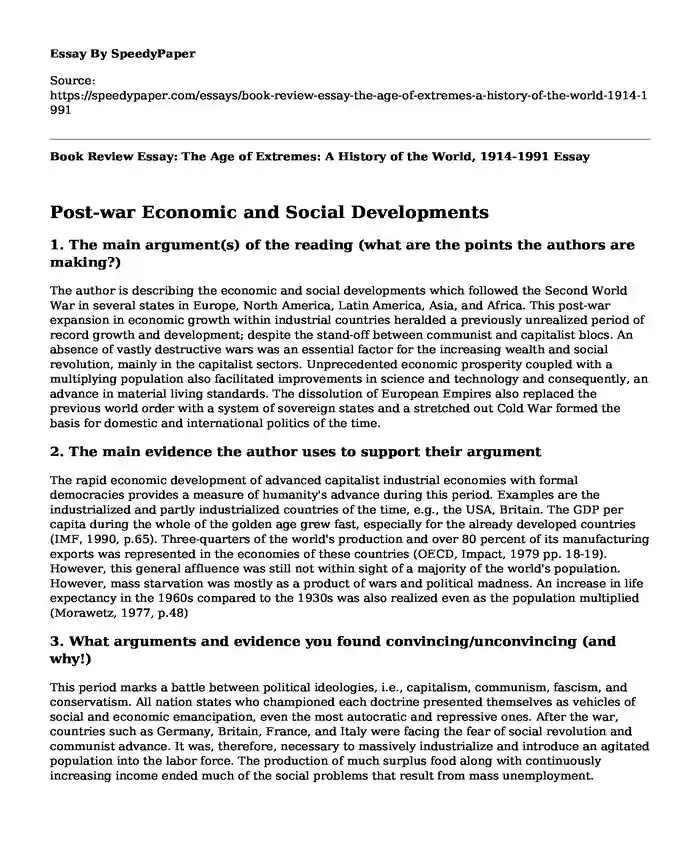
| Essay type: | Book review |
| Categories: | History |
| Pages: | 3 |
| Wordcount: | 816 words |
Post-war Economic and Social Developments
1. The main argument(s) of the reading (what are the points the authors are making?)
The author is describing the economic and social developments which followed the Second World War in several states in Europe, North America, Latin America, Asia, and Africa. This post-war expansion in economic growth within industrial countries heralded a previously unrealized period of record growth and development; despite the stand-off between communist and capitalist blocs. An absence of vastly destructive wars was an essential factor for the increasing wealth and social revolution, mainly in the capitalist sectors. Unprecedented economic prosperity coupled with a multiplying population also facilitated improvements in science and technology and consequently, an advance in material living standards. The dissolution of European Empires also replaced the previous world order with a system of sovereign states and a stretched out Cold War formed the basis for domestic and international politics of the time.
2. The main evidence the author uses to support their argument
The rapid economic development of advanced capitalist industrial economies with formal democracies provides a measure of humanity's advance during this period. Examples are the industrialized and partly industrialized countries of the time, e.g., the USA, Britain. The GDP per capita during the whole of the golden age grew fast, especially for the already developed countries (IMF, 1990, p.65). Three-quarters of the world's production and over 80 percent of its manufacturing exports was represented in the economies of these countries (OECD, Impact, 1979 pp. 18-19). However, this general affluence was still not within sight of a majority of the world's population. However, mass starvation was mostly as a product of wars and political madness. An increase in life expectancy in the 1960s compared to the 1930s was also realized even as the population multiplied (Morawetz, 1977, p.48)
3. What arguments and evidence you found convincing/unconvincing (and why!)
This period marks a battle between political ideologies, i.e., capitalism, communism, fascism, and conservatism. All nation states who championed each doctrine presented themselves as vehicles of social and economic emancipation, even the most autocratic and repressive ones. After the war, countries such as Germany, Britain, France, and Italy were facing the fear of social revolution and communist advance. It was, therefore, necessary to massively industrialize and introduce an agitated population into the labor force. The production of much surplus food along with continuously increasing income ended much of the social problems that result from mass unemployment.
Chapter Thirteen - Real Socialism
1. The main argument(s) of the reading (what are the points the authors are making?
This chapter describes the failure of the socialist challenge beginning with the Bolshevik Revolution of Vladimir Lenin and his leftist revolutionaries. Prior to the Russian revolution, the socialist movement pledged a society without oppression or unhappiness. This revolutionary utopianism was partly responsible for the excesses of Bolshevism. However, the consequences of the kind of social democracy espoused by socialism proved to be unfortunate. This chapter makes an effective criticism of Soviet history spanning its development after the 1917 revolution to the conclusion of the Cold War in the latter part of the twentieth century.
2. The main evidence the author uses to support their argument
After the Bolshevik Revolution of 1917, the ensuing attempts by the Bolsheviks to put up a modern, function, nation-state proved futile; despite the revolution seeing them emerge in control of a vast physical area. The communist Soviet Union that emerged from the revolution failed in its most essential task; building a socialist state, or rather a non-capitalist one, without any help from more economically and industrially advanced countries e.g. Germany. Additionally, the post Tsarist Russia had an unskilled, peasant agrarian populace which could not help immediately realize a massively industrialized and economically developed country. The principal features of Soviet and communist rule during this period are characterized with war against the peasantry, forced industrialization and collectivization of agriculture at a terrible cost to human life.
3. What arguments and evidence you found convincing/unconvincing (and why!)
The Bolshevik Party's attempt, and their subsequent failure, to establish the Soviet Union as the center of a self-contained collectivist economy devoid of any capitalist influences extends to the twenty first century. It is visible in the disintegration of Mikhail Gorbachev's Soviet Union in the nineteen eighties. During the period under communist rule, Eastern Europe was largely synonymous with economic and social backwardness in Europe. The economic dynamism of the developed capitalist world also helped further entrench the idea that communism largely represented grisly economies, despots and a spartan way of life. The original justifications for the decision to establish social rule in Russia disappear with the realities manifested in communist rule. It culminates in the collapse of the Soviet Union and the failure of most other communist states to keep pace economically and industrially with non-socialist ones.
References
Hobsbawm, E. J. (1994). The age of extremes: a history of the world, 1914-1991. Pantheon.
Cite this page
Book Review Essay: The Age of Extremes: A History of the World, 1914-1991. (2022, May 17). Retrieved from https://speedypaper.com/essays/book-review-essay-the-age-of-extremes-a-history-of-the-world-1914-1991
Request Removal
If you are the original author of this essay and no longer wish to have it published on the SpeedyPaper website, please click below to request its removal:
- Essay Sample on How Social Media on Smartphone Affects Our Society
- Essay Sample on Orthopedic Impairements: Jane's Story
- Free Essay Example: Leadership-Applying Concepts
- Free Essay Sample on Drug Addiction
- Alien Agenda Essay Example
- Essay Sample on Health Assessment
- Free Essay: What Critical Metrics Does Your CEO Focuses On?
Popular categories




